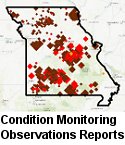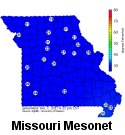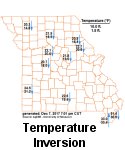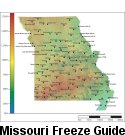
Crop-growing season could be wettest on record for 121 years
Duane Dailey
Writer
University of Missouri Extension
July 31, 2015
COLUMBIA, Mo. - At the end of July, Missouri fell a few raindrops shy of having the wettest May to July on record. Before the final tally of the average, the rain totaled 22.41 inches. The wet record was only 0.14 inch more at 22.55 in 1981.
Pat Guinan, University of Missouri Extension climatologist, says the rainfall total can change. "It could be the wettest on record, as current numbers are preliminary."
It takes a while to receive all rain reports from 200 official reporting stations across the state, said Guinan.
Monthly totals were 7.26 inches in May, 7.31 in June and 7.84 in July. The July rain ranks fourth-wettest going back 121 years.
"The wet year is an anomaly," Guinan says. "It's not just total rain, but the frequency." In three months, the Kansas City weather station reported 48 days with measurable rain. The normal, based on 30 years of records, is 32 days.
Wet weather hit agriculture hard. Crop farmers faced delayed and prevented plantings. Livestock farmers couldn't bale quality hay for winter feed.
"Haymaking was hit hard," says Craig Roberts, MU Extension forage specialist. "Those with management-intensive grazing did well if they matched livestock demand to forage growth. A downside was waterlogged soils."
Frequent cloudy skies affect growing-degree days that drive crop development. Plant photosynthesis depends on sunshine. Water-soaked soils slow root growth and cut usable nitrogen.
"Most unusual was widespread distribution of rain across the state," Guinan told farmers at the annual Crop Injury Clinic at MU Bradford Research Center, Columbia. "There was no drought anywhere."
At the crop clinic, Guinan said El Ni¤o's influence is difficult to discern in Missouri, which is in a transition zone between the northern and southern United States.
Earlier, at the end of regular soybean planting, MU Extension soybean specialist Bill Wiebold said more than 1.3 million acres of the crop remained unplanted in Missouri. The state led the nation in unplanted crop.
On July 27 the Missouri Agricultural Statistics Service reported corn silking fell 28 points behind last year. Soybean blooming was 38 points below last year. The 2014 crop set yield records.
"Not just farming was affected by rain," Guinan said. "Persistent wet conditions create uncomfortable days. High temperatures with high humidity bring heat stress." Guinan noted there were high heat indexes in the summers of 2010 and 2011 as well.
County governments and road districts across the state suffered lost bridges and washed-out culverts. The wet season disrupted construction and transportation, Guinan added.
As state climatologist, Guinan has 24 online real-time Missouri weather stations. Search for "Missouri Mesonet" or go to http://agebb.missouri.edu/weather/stations/.
Source: Pat Guinan, 573-882-5908












